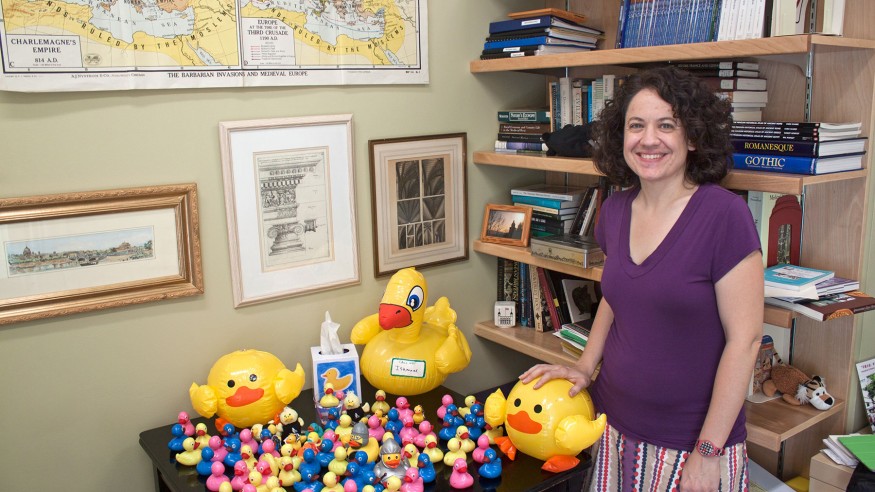
Happy 30th Anniversary, SNC!
Faculty member Ellen Arnold is overseeing this year’s Sagan National Colloquium. The Colloquium will kick off with a presentation from the author of ‘Moby-Duck,’ which looks at the voyage of thousands of rubber ducks that fell from a ship into the sea. (Photo by Caleb Dorfman ’15)
Ohio Wesleyan’s medieval/environmental historian Ellen Arnold recalls wanting to study fresh water ecology as a high school student in Kentucky. Her interests in river ecology were matched only by her love of history.
So when the time drew near to submit topic proposals for OWU’s 2014 Sagan National Colloquium (SNC), Arnold, who once taught a Travel-Learning Course focused on how medieval people incorporated nature and the environment in their daily lives, threw her hat into the ring. Proposal accepted, this year’s Colloquium topic, “H2OWU: Water in Our World,” was finalized.
More of what draws Arnold to issues involving water—besides her childhood heroes, Jacques Cousteau and Bob Ballard—is the recognition of how water is used and valued differently by people of the world; how water can be “everywhere and nowhere” during glacial melt and drought; and how, through everyday intervention, people respond to catastrophic conditions.
“While thinking about programming for SNC, I wanted to bring in people who approached water from multiple disciplinary angles,” says Arnold. “It will be interesting to see how all of these different voices add up.”
She is hopeful people will be intrigued about the number of directions our forthcoming discussions about water will take us, which was part of the rationale for suggesting the summertime common reading for students, Moby-Duck: The True Story of 28,000 Bath Toys Lost at Sea and of the Beachcombers, Oceanographers, Environmentalists, and Fools, Including the Author, Who Went in Search of Them by Donovan Hohn.
Hohn will kick off the Colloquium series at 7 p.m. September 4 in the Benes Rooms of OWU’s Hamilton-Williams Campus Center, sharing the results of his own voyages to find the lost-at-sea toy ducks and other bath toys—7,200 packs—that tumbled off a container ship bound from the Aleutians to Tacoma, Washington, in 1992.
“The explorers and what and how they learn is a metaphor for liberal arts learning,” says Arnold. “We start pulling threads until we see the bigger pictures. These journeys can take us to places we have never been.”
Among Arnold’s hopes, is that the SNC programming will help to raise awareness about a leading world concern. By the end of last year, for example, OWU’s water hydration stations saved the use of more than 40,000 plastic water bottles. Under way now, is a water-related fundraiser featuring the sale of BPH-free water bottles for $5 each.
“We all can stop buying bottled water shipped from other aquifers,” says Arnold. “What we all choose to do with water matters.”
